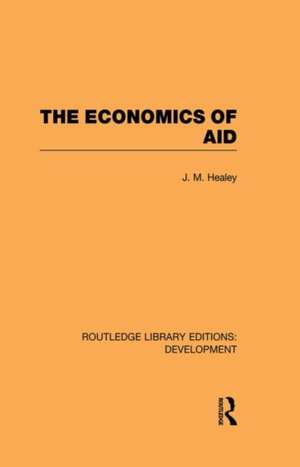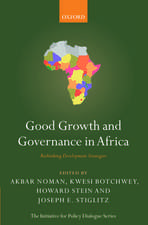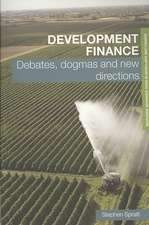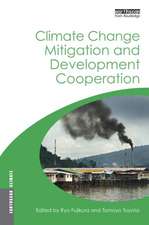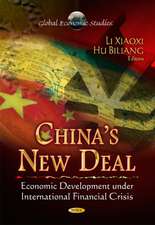The Economics of Aid: Routledge Library Editions: Development
Autor J. M. Healeyen Limba Engleză Paperback – 12 apr 2013
| Toate formatele și edițiile | Preț | Express |
|---|---|---|
| Paperback (1) | 405.66 lei 43-57 zile | |
| Taylor & Francis – 12 apr 2013 | 405.66 lei 43-57 zile | |
| Hardback (1) | 763.07 lei 43-57 zile | |
| Taylor & Francis – 26 noi 2010 | 763.07 lei 43-57 zile |
Din seria Routledge Library Editions: Development
- 36%
 Preț: 823.99 lei
Preț: 823.99 lei - 35%
 Preț: 993.32 lei
Preț: 993.32 lei - 33%
 Preț: 528.32 lei
Preț: 528.32 lei - 36%
 Preț: 822.01 lei
Preț: 822.01 lei - 38%
 Preț: 765.95 lei
Preț: 765.95 lei - 38%
 Preț: 765.23 lei
Preț: 765.23 lei - 18%
 Preț: 1169.03 lei
Preț: 1169.03 lei - 38%
 Preț: 762.72 lei
Preț: 762.72 lei - 36%
 Preț: 823.99 lei
Preț: 823.99 lei - 34%
 Preț: 824.17 lei
Preț: 824.17 lei - 36%
 Preț: 824.89 lei
Preț: 824.89 lei - 36%
 Preț: 823.63 lei
Preț: 823.63 lei - 38%
 Preț: 765.95 lei
Preț: 765.95 lei - 34%
 Preț: 852.88 lei
Preț: 852.88 lei - 18%
 Preț: 1059.93 lei
Preț: 1059.93 lei -
 Preț: 372.29 lei
Preț: 372.29 lei - 18%
 Preț: 997.45 lei
Preț: 997.45 lei - 25%
 Preț: 243.12 lei
Preț: 243.12 lei - 38%
 Preț: 763.07 lei
Preț: 763.07 lei - 38%
 Preț: 766.12 lei
Preț: 766.12 lei - 36%
 Preț: 824.89 lei
Preț: 824.89 lei - 18%
 Preț: 1056.63 lei
Preț: 1056.63 lei - 36%
 Preț: 850.02 lei
Preț: 850.02 lei - 38%
 Preț: 765.40 lei
Preț: 765.40 lei - 36%
 Preț: 853.07 lei
Preț: 853.07 lei - 37%
 Preț: 1977.58 lei
Preț: 1977.58 lei - 36%
 Preț: 850.73 lei
Preț: 850.73 lei - 27%
 Preț: 263.97 lei
Preț: 263.97 lei - 36%
 Preț: 822.01 lei
Preț: 822.01 lei - 23%
 Preț: 325.33 lei
Preț: 325.33 lei - 36%
 Preț: 821.82 lei
Preț: 821.82 lei - 18%
 Preț: 1059.62 lei
Preț: 1059.62 lei - 29%
 Preț: 249.56 lei
Preț: 249.56 lei - 36%
 Preț: 824.34 lei
Preț: 824.34 lei - 36%
 Preț: 825.78 lei
Preț: 825.78 lei - 34%
 Preț: 765.95 lei
Preț: 765.95 lei - 35%
 Preț: 996.03 lei
Preț: 996.03 lei - 18%
 Preț: 1060.56 lei
Preț: 1060.56 lei - 24%
 Preț: 320.94 lei
Preț: 320.94 lei - 34%
 Preț: 485.19 lei
Preț: 485.19 lei - 34%
 Preț: 824.34 lei
Preț: 824.34 lei - 27%
 Preț: 242.71 lei
Preț: 242.71 lei - 38%
 Preț: 764.34 lei
Preț: 764.34 lei - 28%
 Preț: 279.12 lei
Preț: 279.12 lei -
 Preț: 399.87 lei
Preț: 399.87 lei - 35%
 Preț: 530.66 lei
Preț: 530.66 lei - 36%
 Preț: 851.46 lei
Preț: 851.46 lei - 18%
 Preț: 1056.00 lei
Preț: 1056.00 lei - 38%
 Preț: 762.36 lei
Preț: 762.36 lei - 39%
 Preț: 679.23 lei
Preț: 679.23 lei
Preț: 405.66 lei
Nou
Puncte Express: 608
Preț estimativ în valută:
77.65€ • 84.37$ • 65.27£
77.65€ • 84.37$ • 65.27£
Carte tipărită la comandă
Livrare economică 21 aprilie-05 mai
Preluare comenzi: 021 569.72.76
Specificații
ISBN-13: 9780415851053
ISBN-10: 041585105X
Pagini: 136
Dimensiuni: 156 x 234 mm
Greutate: 0.2 kg
Ediția:1
Editura: Taylor & Francis
Colecția Routledge
Seria Routledge Library Editions: Development
Locul publicării:Oxford, United Kingdom
ISBN-10: 041585105X
Pagini: 136
Dimensiuni: 156 x 234 mm
Greutate: 0.2 kg
Ediția:1
Editura: Taylor & Francis
Colecția Routledge
Seria Routledge Library Editions: Development
Locul publicării:Oxford, United Kingdom
Cuprins
1. Aid: Motives 2. Aid: Allocation Principles 3. Aid and Economic Growth I 4. Aid and Economic Growth II 5. Debt and the Terms of Aid 6. Aid Tying: Trade and Resource Allocation Effects 7. Some Questions and Further Issues
Descriere
First published in 1971, this reissue considers the main aspects of foreign aid to developing countries in terms of economic concepts and principles. The author gives an economic definition of aid and considers the motives for giving aid and the principles on which it may be allocated. He looks at the effect on the economic growth of developing countries of both the aid given and the need to repay the debt, and the effect on trade patterns and resource allocation of tying aid to one particular project, or one source of goods. While economic analysis is only a first step in providing a basis for policy decisions on foreign aid, Dr Healey shows that many issues can be clarified by looking at them from the economists’ point of view.
